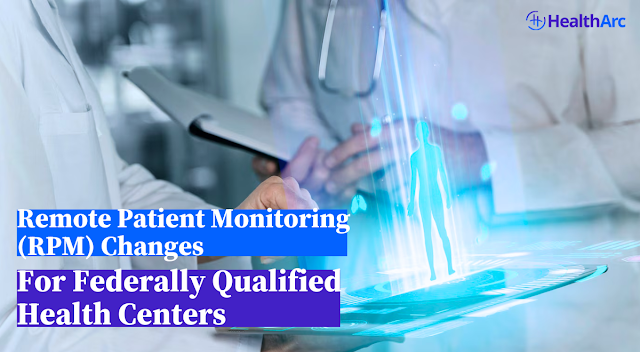Remote Patient Monitoring (RPM) Changes for Federally Qualified Health Centers
Both FQHCs and RHCs serve as lifelines for people who lack easy access to healthcare programs, serving as the cornerstone of equitable and accessible healthcare. These facilities are helping to advance the continuous initiatives to improve everyone's access to healthcare. They are taking the initiative to build a more inclusive and healthy society because of their commitment to cultural sensitivity, affordability, preventive care, and community cooperation.
New Developments in Federally Qualified Health Center (FQHC) Remote Monitoring Services
Remote Patient Monitoring (RPM) services at Federally Qualified Health Centers (FQHCs) have undergone substantial modifications in an effort to improve care delivery and reimbursement procedures.
Decommissioning of the G0511 code
CMS announced the decommissioning of the G0511 code for care management, which will enable FQHCs to bill for both RPM and Chronic Care Management (CCM) services using the current CPT codes. These care coordination services must be coded and billed by FQHCs and RHCs using their current Current Procedural Terminology (CPT) codes by 2025.
In order to facilitate the transition, CMS has allowed FQHCs and RHCs to continue billing G0511 for a period of six months, until the end of June 2025.
Switching from G0511 to Particular CPT Codes
CMS completed the switch to specific Current Procedural Terminology (CPT) codes for RPM services in 2025, replacing the old, all-inclusive HCPCS number G0511. FQHCs can now more precisely bill for the various remote patient monitoring services they offer thanks to this change. The following CPT codes are now applicable for RPM:
99453: Initial RPM device setup and patient instruction.
99454: Data transfer and RPM device supply every 30 days.
99457: Treatment management and remote monitoring services with a minimum of 20 minutes of clinical staff time.
99458: Applied to CPT code 99457 for every extra 20 minutes of treatment management services.
Increased Coverage for Care Management Services
CMS has permitted FQHCs and RHCs to offer care services for the following in addition to Remote Patient Monitoring, Chronic Care Management, and Remote Therapeutic Monitoring (RTM) services:
Primary care, preventive services, and chronic illness management are all part of PCM (Principal Care Management), which oversees the general health of patients.
For comprehensive management of mental and physical health, behavioral health integration, or BHI, combines behavioral health services with primary care.
Through community-based health initiatives, CHI (Community Health Integration) aims to increase well-being by addressing social determinants of health.
PIN (Principal Illness Navigation): PIN services are navigational aids for patients with high-risk, serious conditions that are offered by peer support providers or auxiliary staff.
Advanced Primary Care Management, or APCM, uses data and technology to provide better, patient-centered care for proactive health management.
Better Billing Prospects for Remote Patient Monitoring
By extending the coverage of care management services, the 2025 billing rule enhanced the billing prospects for FQHCs and RHCs. It is easier to concentrate on giving patients the appropriate therapies and enough consultation time when FQHCs and RHCs are permitted to bill using the current care management CPT codes.
This modification enhances reimbursement prospects in addition to increasing accuracy in the provision of care management services.
HealthArc Makes Care Management Easier for RHCs and FQHCs
FQHCs have opportunities to enhance RPM services and billing practices through the 2025 CMS billing code upgrade. FQHCs can enhance care coordination, optimize reimbursement, and offer high-quality care to underprivileged communities with chronic illnesses by putting these changes into practice.
With a comprehensive digital health platform that is easy to integrate and implement in any workflow setting, HealthArc is your reliable partner for enhancing patient outcomes and engagement.
For every chronic condition, our AI-powered platform offers therapeutic paths that can be tailored with provider input to target at-risk or non-compliant patients who need frequent consultations with their medical professionals. For correct payments, billing paperwork is also accessible for services such as Transitional Care Management (TCM), Principal Care Management (PCM), Chronic Care Management (CCM), Remote Therapeutic Monitoring (RTM), and Remote Patient Monitoring (RPM).
To find out more about FQHC's billing codes, kindly request a free demo.
%20Changes%20for%20Federally%20Qualified%20Health%20Centers%20(1).png)


Comments
Post a Comment